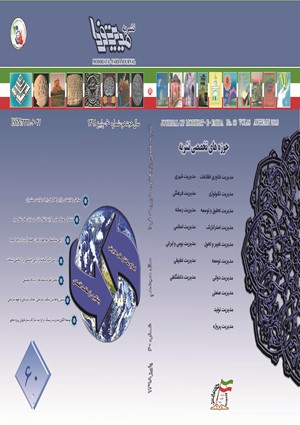شناسایی عوامل حیاتی موفقیت بانکداری پایدار با رویکرد آمیخته
محورهای موضوعی : مدیریت دانشعلیرضا علی احمدی 1 , میر حمید تقوی 2 , علی بنیادی نائینی 3
1 - دانشگاه علم و صنعت ایران
2 - سیاستگذاری علم و فناوری-دانشگاه علم و صنعت ایران
3 - دانشگاه علم و صنعت ایران
کلید واژه: بانکداری پایدار, توسعه پایدار, بازاریابی تامین مالی, رویکرد آمیخته عوامل حیاتی موفقیت,
چکیده مقاله :
یک مفهوم جدید در حوزه دستیابی به اهداف توسعه پایدار، بانکداری پایدار میباشد که بویژه در کشورهای درحال توسعه از اهمیت بسیار بالایی برخوردار است. برای موفقیت در نیل به اهداف بانکداری پایدار لازم است تا عوامل زیربنایی آن شناسایی و مفهومسازی شوند. این مقاله با هدف شناسایی عوامل حیاتی موفقیت بانکداری پایدار انجام شده است. مقاله حاضر از نظر هدف یک تحقیق کاربردی است و با رویکردی پیمایشی- مقطعی انجام شده است. برای گردآوری دادهها از مصاحبه نیمساختار یافته و پرسشنامه خبرگانی استفاده شده است. جامعه آماری تحقیق شامل مدیران و کارشناسان بانک مرکزی میباشد که به روش هدفمند، نمونهای از میان این خبرگان انتخاب شده است. روش شناسی تحقیق بر مبنای رویکرد آمیخته (کیفی-کمی) است. در مرحله کیفی، از روش تحلیل مضامین (تِم) برای شناخت عوامل حیاتی موفقیت بانکداری پایدار استفاده شده است. سپس در مرحله کمی، عوامل شناسایی شده براساس روش دلفی فازی و سوارا غربالگری و تعیین اولویت شده است. نتایج نشان داده است عوامل حیاتی موفقیت بانکداری پایدار در سه محور عوامل درونداد، عوامل فرآیندی و عوامل برونداد قابل دستهبندی میباشند. از میان عوامل، پشتیبانی از کارآفرینان، مدیریت بازاریابی، وضع مقررات روشن و ارزیابی فرآیندها از بیشترین اهمیت در حوزه بانکداری پایدار برخوردار هستند.
A new concept in the area of achieving sustainable development goals is sustainable banking which is of particular importance in developing countries. To succeed in achieving sustainable banking goals, it is necessary to identify and conceptualize the underlying factors. This paper aims to identify the critical factors for sustainable banking success. This paper is an applied research in terms of purpose and has been done with a cross-sectional survey approach. Semi-structured interviews and expert questionnaire were used for data collection. The statistical population of the study consists of managers and experts of the central bank selected by purposeful sampling from among these experts. The research methodology is a mixed (qualitative-quantitative) approach. In the qualitative phase, the thematic analysis method is used to identify the critical factors for sustainable banking success. Then, at the quantitative stage, the identified factors are screened and prioritized based on the Fuzzy Delphi and SWARA method. The results show that the critical success factors of sustainable banking can be categorized into three factors: input factors, process factors and output factors. Support entrepreneurs, marketing management, clear regulation and process evaluation are of the utmost importance in the field of sustainable banking.
الوانی، مهدی؛ آذر، عادل؛ داناییفرد، حسن. (1391)، روش شناسی پژوهش کیفی در مدیریت: رویکردی جامع، انتشارات صفار.#
تبریزی، منصوره. (1393)، تحلیل محتوای كیفی از منظر رویكردهای قیاسی و استقرایی، نشریه علوم اجتماعی، شماره 64، ص 105 تا 138.#
لطيفي، سميه؛ راحلي، حسين؛ يادآور، حسين. (1397)، شناسايي و تبيين مراحل اجرايي توسعه كشاورزي حفاظتي در ايران با رويكرد دلفي فازي. مهندسی بیوسیستم ایران، دوره 49، شماره 1، ص 107 تا 120.#
محمدی، عباس. (1396)، روش تحقیق کیفی در علوم اجتماعی، انتشارات ورجاوند. #
هالیدی، آدریان. اجرا و نگارش پژوهش کیفی، ترجمه مهری بهار (1394)، انتشارات علم.#
Bouma, J. J., Jeucken, M., & Klinkers, L. (Eds.). (2017). Sustainable banking: The greening of finance. Routledge#.
Carè, R. (2018). Emerging Practices in Sustainable Banking. In Sustainable Banking (pp. 65-92). Palgrave Pivot, Cham#.
Carè, R. (2018). Exploring the Role of Banks in Sustainable Development. In Sustainable Banking (pp. 39-64). Palgrave Pivot, Cham#.
Carè, R. (2018). Sustainable Banking: Issues and Challenges. Springer#.
Cheng, C. H., & Lin, Y. (2002). Evaluating the best main battle tank using fuzzy decision theory with linguistic criteria evaluation. European journal of operational research, 142(1), 174-186#.
Diaz, F., & Silva, N. (2018). Banking development, stability and sustainability: a Conference#.
Dugelay, E., Asiru, B. (2017). Progress on sustainable banking A global perspective, The financial sector and the future of the planet. 13(3), 175-179#.
Figueres, C., & Blom, P. (2018). Building blocks for a sustainable finance future for Europe. Policy & Politics, 34(3), 429-451#.
Forcadell, F. J., & Aracil, E. (2017). Sustainable banking in Latin American developing countries: Leading to (mutual) prosperity. Business Ethics: A European Review, 26(4), 382-395#.
Goren, G., & Wolters, T. (2018). Sustainable banking: the mysterious role of commercial banks in achieving a sustainable economy. In Corporate Sustainability (pp. 113-151). Routledge#.
Jeucken, M. (2010). Sustainable finance and banking: The financial sector and the future of the planet. Routledge#.
Keršuliene, V., Zavadskas, E. K., & Turskis, Z. (2010). Selection of rational dispute resolution method by applying new step‐wise weight assessment ratio analysis (SWARA). Journal of business economics and management, 11(2), 243-258#.
Miller, K., McAdam, R., & McAdam, M. (2018). A systematic literature review of university technology transfer from a quadruple helix perspective: toward a research agenda. R&D Management, 48(1), 7-24#.
Ordoñez, G. (2018). Sustainable shadow banking. American Economic Journal: Macroeconomics, 10(1), 33-56#.
Ramnarain, T. D., & Pillay, M. T. (2016). Designing Sustainable Banking Services: The Case of Mauritian Banks. Procedia-Social and Behavioral Sciences, 224, 483-490#.
Sustainable Financing for Sustainable Development: World Bank Group Capital Package Proposal, Report to Governors at 2018 Spring Meetings#.
Tzeng, G.-H., Teng, J.-Y.(1993) Transportation investment project selection with fuzzy multiobjectives. Transp.Plann. Technol. 17(2), 91–112# .
Wu, Chih-Hung; Fang, Wen-Chang. (2011), Combining the Fuzzy Analytic Hierarchy Process and the fuzzy Delphi method for developing critical competences of electronic commerce professional managers; Qual Quant, Vol. 45, PP. 751–768#.
Yip, A. W., & Bocken, N. M. (2018). Sustainable business model archetypes for the banking industry. Journal of cleaner production, 174, 150-169#.


